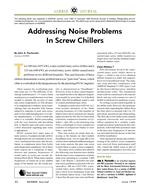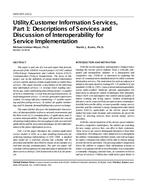To achieve the highest efficiency, residential furnaces and boilers must operate in the condensing mode. Corrosion-resistant materials must be chosen for the secondary heat exchanger due to the corrosivity of the flue-gas condensate. This paper describes the of research status on corrosion-resistant materials being conducted under the sponsorship of the gas industry and the federal government.
Three different laboratory studies are discussed . In these studies, various metal alloys were evaluated for resistance to several modes of corrosive attack while cyclically exposed to flue-gas condensate that was spiked to increase its chloride level. These studies evaluated the corrosion resistance of various fabrication methods and, in addition, evaluated the role of condensate corrosivity gradients on the corrosion resistance of selected metallic materials and various fabrication methods under realistic and locally varying condensing conditions. The results and implications of these tests are presented.
Units: I-P
Citation: Symposium, ASHRAE Transactions, 1985, vol. 91, pt. 2B, Honolulu, HI
Product Details
- Published:
- 2009
- Number of Pages:
- 23
- File Size:
- 1 file , 1.4 MB
- Product Code(s):
- D-HI-85-14-1


